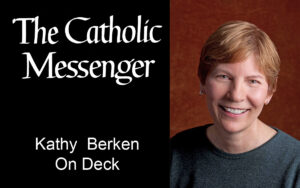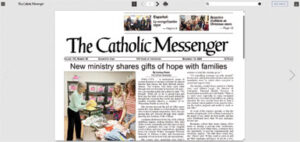Whenever I begin a spiritual direction visit or write a retreat conference, I turn to one of two prayer books that have sustained me over the years. The pages have come loose and oft-used prayers are bookmarked.
“Essential Mystic Prayers” (Paraclete Press 2018) and “To Bless the Space Between Us: A Book of Blessings,” by John O’Donohue (Doubleday 2008) are my current favorites.
In times when we feel doubt, confusion, anxiety, fear, helplessness, sadness or depression, sometimes the words of wise spiritual teachers can lift us up and give us new perspectives. In times when we simply need to use another’s wisdom to help give us some inspiration, these prayers can increase our awareness that faith, hope and love are still alive.
“Essential Mystic Prayers” has 88 prayers written by a variety of well-known men and women from the past 2,000 years, including St. Francis of Assisi (who simply prays, “My God and my all!”), Julian of Norwich, Thomas Merton, Joyce Rupp, St. Thomas Aquinas and St. Therese of Lisieux. All prayers are fewer than 20 lines, so they are easily read in a minute or two on a busy morning or sleepy evening. Chapter topics include Praise and Trust, Mercy and Peace, Wisdom and Guidance, Holy Presence, and others.
“To Bless the Space Between Us” contains blessings for most any occasion or situation. The late Father O’Donohue is known for his deep sense of Celtic spirituality and this collection of blessings does not disappoint. His 224 pages are catalogued by Beginnings, Desires, Thresholds, Homecomings, States of Heart, Callings, and Beyond Endings, each with an introductory essay.
I’ve been using “Beannacht” (Gaelic for “blessing” or “greeting”) as a blessing for the new year, as Father O’Donohue suggests. The third verse contains the Gaelic word “curragh”— a boat made of canvas — so it makes more sense when you pray: “When the canvas frays / In the curragh of thought / And a stain of ocean / blackens beneath you, / May there come across the waters / A path of yellow moonlight / To bring you safely home.”
He fills his blessings with images of natural settings, especially those of his homeland, Ireland, contrasting deep emotions and relatable situations with airs of hope and light. When he writes, “On the day when / The weight deadens / On your shoulders / And you stumble,” the reader may immediately identify with the emotion evoked, perhaps reflecting the mood of the times. Then he ends the verse with a blessing: “May the clay dance / To balance you.”
Father O’Donohue hears, understands and accepts how we may be experiencing life and gives us a remarkable gift. He blesses us in a way that lifts us out of our despair, even for a fleeting minute, to give us hope.
Another favorite prayer is “For Belonging” in which each of the nine verses is a unique blessing: “May you listen to your longing to be free / . . . May you allow the wild beauty of the invisible world to gather you, mind you, and embrace you in belonging.” When I’ve prayed this in the context of a retreat or spiritual direction, I’ve been humbled by the tears of those who are hearing this blessing for the first time.
We may choose to pray short prayers from ancient mystics who shed light on eternal subjects about the divine presence of God. We may prefer to repeat blessing prayers from a contemporary spiritual writer who touches the core of our common experiences. We may rely on the traditional prayers of our religious upbringing. When we pray in any of these ways and when we participate in the prayers of the Eucharist, we express our faith in a God who is ever present in our lives.
(Kathy Berken is a spiritual director and retreat leader in St. Paul, Minnesota. She lived and worked at L’Arche in Clinton — The Arch from 1999-2009.)










